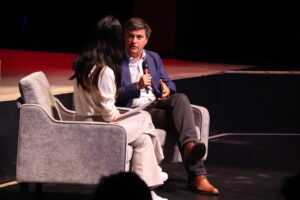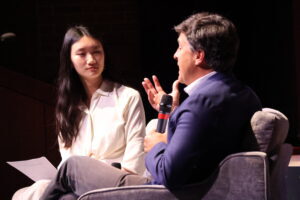November 05, 2024
NYT Journalist Discusses News in an Unorthodox Political Era
New York Times Washington investigative journalist and Pulitzer-prize-winning writer Mark Mazzetti spoke at a recent assembly. “Mazzetti’s perspective can deepen our understanding of the media’s role in democracy,” Head of the Upper School Lisa Loeb said, “and how journalism can hold leaders accountable.” Raine Wang, editor-in-chief of the KO News, interviewed Mazzetti with very well-considered questions to gain insights into Mazzetti’s practice and career. 
Without wasting any time, Wang opened with a question on everyone’s mind: the presidential election. She asked Mazeeti how this tense election cycle is affecting newsrooms across the country. Mazzetti remarked that since 2016, new organizations have grappled with covering Trump, a highly unorthodox political figure. He said one way the news approached his election this year was to adjust polling, as Trump’s support was undercounted in 2016 and 2020. “This time, they have a built-in model in their polling to try and capture what they think is more of Trump’s support,” he said. “The one big question will be: were they right to do this?”
Mazzetti said it’s a tightrope presenting information since the nation is divided, and people live in alternate realities of the truth. “We try to cover the story in the best way we can, which is to be objective and fair,” he said. “It does not mean treating all sides or both sides equally.” He said that it is impossible to be 100% objective because, as humans, we are all prone to biases, but your job as a journalist is to expose injustices and bring them to light.
Wang asked Mazzetti if he was aware he was co vering a major story as it was happening in real-time, such as his coverage of Russian interference in the 2016 election and, more recently, the Isreal-Hamas war. He said that he immediately understood that the coverage of the MidEest was a big story. He said that “journalists have to cover the story under intense circumstances and do it under intense criticism for what they’re doing. It was very, very, very intense to discuss what do we cover? What angles do we cover? Whose perspectives do we show?”
vering a major story as it was happening in real-time, such as his coverage of Russian interference in the 2016 election and, more recently, the Isreal-Hamas war. He said that he immediately understood that the coverage of the MidEest was a big story. He said that “journalists have to cover the story under intense circumstances and do it under intense criticism for what they’re doing. It was very, very, very intense to discuss what do we cover? What angles do we cover? Whose perspectives do we show?”
Mazzetti said that many times within the newsroom, there are conflicts in covering a story, but he explained that as professionals, they recognize they are not advocating for a position. He said the people one speaks with and interviews inform your perspective. “The goal is to produce as much content as possible from as many different perspectives as possible,” he said.
Mazzetti told the audience he worked for the LA Times, US News and World Report and The Economist earlier in his career. In the spring of 2001, he moved to DC, and his editor asked if he wanted to cover the Pentagon even though he had little understanding of national defense or security. At the time, the Pentagon beat was considered sleepy, but all of that changed within months on September 11. Mazzetti was in the Pentagon on 9/11, and he headed to Afghanistan shortly after.
He said much of his career was an act of serendipity, where circumstances aligned and he found himself in certain jobs and locales. He said he greatly respects war correspondents who put themselves in harm’s way to cover a story. “I don’t consider myself one of those incredibly brave people,” he said. “But even they recognize that there’s one thing to take risks for a story, but no story is worth dying for.”
Mazzetti relies on the expertise of local journalists, who have insights on the ground to cover a story properly. He collaborates with local journalists and travels with them to navigate the language, customs, and terrain.
Mazzetti has navigated the economic vagaries of the newspaper business and thought he jinxed publications because they would downsize the staff soon after he started working at the publication. At one point in the industry, he said, insiders felt that journalism could not survive due to the availability of news from free sources on the internet. Eventually, the NYT made the risky bet that people would subscribe to the paper, which set the paper on more solid footing. “There has to be a lot of healthy news organizations,” he said. “To those in the audience considering a career in media journalism, “I actually think you will be entering the industry in a more hopeful time.” The NYT has adapted to the new ways people consume news by serving it via Facebook, Twitter, and Snapchat.
Mazzetti addressed the disinformation that is flooding various platforms. He is frustrated by the disinformation and the difference in standards from one news outlet to another. At one time, Mazzetti found Twitter to be a valuable source of information because it immediately delivered breaking news from around the world. Now, he finds Twitter especially egregious in serving news because it is done through an algorithm. “I think the owners of social media platforms are doing a terrible job dealing with the issue of disinformation,” he said.
“There are news organizations who are trying their best and in good faith to report honestly because they think it’s important for our country,” he said. “It’s important for the health of our democracy to hold the government accountable and to tell people what they may not want to hear.”
